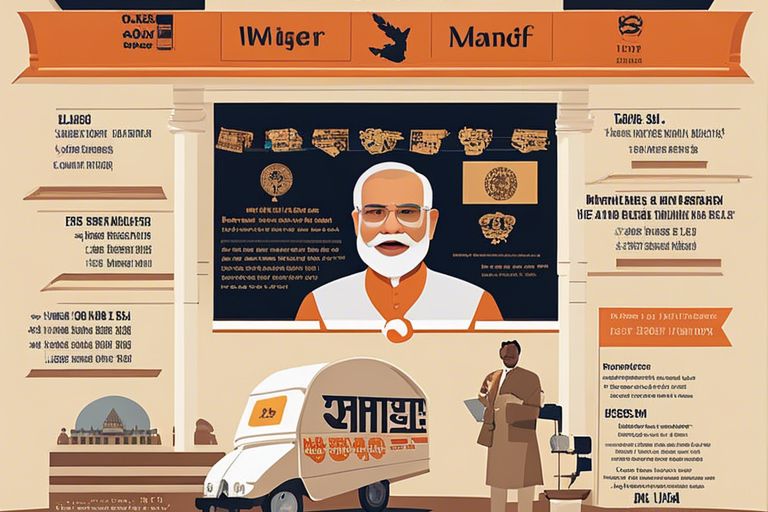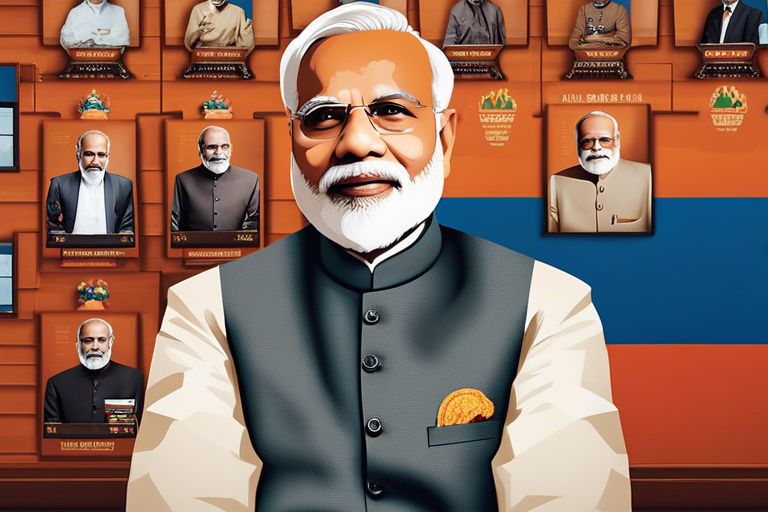Ponder upon the name Narendra Modi, and what comes to mind are images of a powerful, influential leader who has shaped the landscape of Indian politics. However, there is much more to the man than meets the eye. Narendra Damodardas Modi, the full name of the Prime Minister, carries with it a wealth of lesser-known facts that shed light on the multi-faceted persona of this enigmatic leader. While his name is widely recognized on a global scale, there are various aspects of his journey and character that remain obscure to the general public.
Narendra Modi, born on September 17, 1950, in Vadnagar, Gujarat, has had an illustrious political career that has seen him rise from humble beginnings to the pinnacle of power in India. He belongs to the Bharatiya Janata Party (BJP), the right-wing nationalist political party of India, and has been an influential figure both within the country and on the international stage. Over the years, Modi has garnered a plethora of both staunch supporters and fervent detractors, given his controversial policies and decisions. However, regardless of where one stands on the political spectrum, it is undeniable that Modi is a force to be reckoned with. Throughout his tenure as Prime Minister, he has implemented bold economic reforms, infrastructure development projects, and foreign policy initiatives, shaping the destiny of India in the 21st century. In this blog post, we delve into the depths of Narendra Modi’s journey, exploring his full name and uncovering some lesser-known facts that contribute to the mosaic of his persona.
Key Takeaways:
- Narendra Modi’s full name: Narendra Damodardas Modi
- Family background: He was born into a lower-middle-class family in Vadnagar, Gujarat
- Early life: Modi’s father was a tea seller and he helped his father sell tea at the Vadnagar railway station
- Education: He has a master’s degree in political science from Gujarat University
- Political career: Modi rose through the ranks of the Rashtriya Swayamsevak Sangh (RSS) and the Bharatiya Janata Party (BJP) before becoming the Prime Minister of India
- Global influence: He has been praised for his efforts to promote international diplomacy and improve India’s economic and social development
- Criticism: Modi has also faced criticism for his handling of religious tensions and human rights issues in India
Narendra Modi’s Personal Profile
Obviously, to understand the Prime Minister of India, it is important to delve into his personal profile. This includes his full name, lesser-known facts about his early life, and his formative years that have shaped his leadership style.
The Full Name Explained
Profile: Narendra Modi’s full name is Narendra Damodardas Modi. The name ‘Narendra’ is of Sanskrit origin and means ‘lord of men’ or ‘king’. ‘Damodardas’ is a combination of ‘Dama’, meaning ‘rope’, and ‘Darda’, meaning ‘one who has’. The name holds deep spiritual significance, reflecting the Prime Minister’s roots in traditional Hindu culture and philosophy.
Birth and Early Childhood
Modis: Narendra Modi was born on September 17, 1950, in Vadnagar, a small town in Gujarat, India. His father, Damodardas Mulchand Modi, ran a tea stall at the Vadnagar railway station, and his mother, Hiraben Modi, worked as a domestic helper. Modi’s early years were marked by humble beginnings, and he experienced the challenges and hardships faced by many families in India.
Full: Despite the financial struggles, Modi’s parents instilled in him a strong work ethic and moral values. This upbringing laid the foundation for his unwavering determination and commitment to serving the nation, which he carries with him to this day.
Education and Formative Years
Name: Narendra Modi’s education took place at the Rashtriya Swayamsevak Sangh (RSS) school in Vadnagar, where he was introduced to the ideological and cultural teachings of the RSS. He later completed his higher education at the University of Delhi, where he delved into the study of political science and acquired valuable insights into the workings of the Indian political system.
Education: Modi immersed himself in various leadership roles during his formative years, including serving as a pracharak (campaigner) for the RSS, which shaped his understanding of grassroots activism and community engagement. These experiences played a pivotal role in shaping his leadership approach and political ideology.
Ascension in Politics
Early Political Involvement
An active member of the Rashtriya Swayamsevak Sangh (RSS) in his early years, Narendra Modi rose through the ranks and quickly became a prominent figure in the Bharatiya Janata Party (BJP). His organizational skills and dedication to the party’s ideology caught the attention of party leaders, leading to a series of important appointments within the party ranks.
As a result of his unwavering commitment and hard work, Narendra Modi quickly made a name for himself and gained a reputation as a skilled strategist and effective administrator, which ultimately propelled him into prominent positions within the party.
Tenure as Chief Minister of Gujarat
Any discussion of Narendra Modi‘s political career would be incomplete without a mention of his tenure as Chief Minister of Gujarat. It was during this time that he faced one of the most challenging periods of his political career, with the state being engulfed in communal violence and controversy. Despite these challenges, Modi implemented several economic and social initiatives that significantly contributed to the state’s development.
It is important to note that Modi faced criticism for his handling of the 2002 Gujarat riots, which had a lasting impact on his political career, both nationally and internationally. However, his supporters point to the economic progress and infrastructure development that occurred during his tenure as Chief Minister as evidence of his effective governance.
Prime Ministerial Tenure
For the past seven years, Narendra Modi has served as the Prime Minister of India. His tenure has been marked by a series of significant events and policy changes that have shaped the country’s political landscape.
Election Campaigns and Strategies
Election campaigns and strategies have been a crucial factor in Narendra Modi’s journey to becoming the Prime Minister of India. His innovative use of social media, charismatic oratory skills, and the promise of development and economic growth have played a pivotal role in connecting with the Indian electorate and securing his position as the country’s leader.
Domestic Policies
Triumphing over various domestic challenges, Narendra Modi’s tenure has seen the implementation of several key policies such as Swachh Bharat Abhiyan, Make in India, and the Goods and Services Tax (GST) which have aimed to bring about positive and groundbreaking changes in India’s domestic landscape. These policies have brought significant changes to the Indian economy, infrastructure, and sanitation programs.
Any discussion of Narendra Modi’s domestic policies would be incomplete without mentioning his efforts to promote digital India, empower women through initiatives such as Beti Bachao, Beti Padhao, and provide affordable healthcare for all through the Ayushman Bharat scheme.
Foreign Policy and International Relations
Prime Minister Narendra Modi has been forging strong international relations with global superpowers such as the United States, Russia, and China, while also strengthening ties with neighboring countries and traditional allies. His proactive engagement in international diplomacy, combined with his strong leadership, has positioned India as a significant player on the world stage.
Programs such as the Make in India initiative, the International Solar Alliance, and the Act East policy have propelled India onto the global platform as a leader in innovation, sustainability, and economic cooperation.
Lesser-Known Facts About Narendra Modi
Personal Life and Lifestyle
Personal Life and Lifestyle
For a man who holds the highest position in the country, Narendra Modi lives a surprisingly simple and frugal lifestyle. He is known to be an early riser, starting his day at 5 am, and is known for his strict vegetarian diet and love for yoga. In his personal life, he is said to be a devoted practitioner of the ancient Indian art of Ayurveda, and his simplicity is reflected in his preference for wearing traditional Indian attire.
Unconventional Milestones and Records
For the man who came from humble beginnings, Narendra Modi’s journey to becoming the Prime Minister of India is nothing short of extraordinary. From being a tea seller at a train station to leading the world’s largest democracy, his rise has shattered conventional norms and inspired millions. He has broken records and set new milestones, including being the first sitting Indian prime minister to visit Israel and the first Indian prime minister to visit Palestine.
Facts. Narendra Modi has set a record for being the most-followed leader on social media platforms, with a massive following on Twitter, Facebook, and Instagram. His unconventional approach to diplomacy and governance has garnered international attention, and his efforts to elevate India’s global standing have earned him both praise and criticism.
Inspirational Anecdotes and Quotes
Facts. Narendra Modi’s speeches and quotes are known for their inspiring and motivational content. His words have resonated with people across the globe, and his leadership style is often cited as a source of inspiration for aspiring leaders. His ability to connect with the masses through his powerful oratory and relatable anecdotes has won him a dedicated following.
To the people of India and beyond, Narendra Modi’s journey is a testament to the power of perseverance, dedication, and unwavering determination. His life and career serve as an inspiration to millions, and his words continue to ignite hope and drive positive change.
It’s remarkable how a man of such humble beginnings has risen to become a global leader, breaking barriers and setting new standards. His unconventional approach, coupled with his inspiring anecdotes and quotes, has left an indelible mark on the world stage.
Public Perception and Critiques
To truly understand the public perception of Narendra Modi, it is essential to examine both the national approval ratings and the criticisms and opposition he has faced during his time as Prime Minister of India.
National Approval Ratings
Ratings for Narendra Modi have been a topic of great interest and controversy. Despite a mixed and evolving opinion, Modi has consistently maintained a relatively high level of popularity and support. His strong leadership and decisive actions have often been cited as the reasons behind his high approval ratings, especially in times of national crisis.
Additionally, his government’s various initiatives and policies, such as Swachh Bharat Abhiyan and Make in India, have also contributed to his positive ratings among the Indian populace.
Criticisms and Opposition
Perception of Narendra Modi is not unanimous, and the Prime Minister has faced significant criticisms and opposition during his tenure. Critics have raised concerns about his handling of certain situations, including economic policies, religious tensions, and the state of freedom of speech in India. His leadership style and the actions of his administration have also been widely debated and criticized.
To add, there have been widespread protests and demonstrations against Modi’s government, particularly in relation to controversial laws and policies. While he has maintained a significant level of support, the opposition to his leadership cannot be overlooked.
National and international media have extensively covered both the praise and the controversies surrounding the Prime Minister, contributing to the diverse range of opinions regarding his governance.

Narendra Modi in the Digital Age
Unlike many world leaders of his time, Prime Minister Narendra Modi has fully embraced the digital age and has successfully leveraged social media and digital technologies to connect with the citizens of India and the world at large.
Social Media Presence and Influence
The Prime Minister has a massive social media presence, with millions of followers on platforms such as Twitter, Facebook, and Instagram. His influence on these platforms is unparalleled, with his tweets and posts often shaping public discourse and opinion on a wide range of issues. The impact of his social media presence cannot be overstated, as it has allowed him to directly communicate with the public and bypass traditional media channels.
Digital Campaigns and Innovations
Digital campaigns have played a crucial role in Narendra Modi’s political journey. His innovative use of digital platforms for election campaigning has set new standards in the political arena. The Prime Minister’s team has been at the forefront of utilizing digital tools and technologies to engage with voters and disseminate his message effectively.
Campaigns such as ‘Digital India’ and ‘Make in India’ have not only showcased India’s capabilities in the digital space but have also catalyzed the country’s digital transformation and economic growth. These innovative campaigns have garnered widespread attention and have positioned India as a global player in the digital economy.
Legacy and Future Prospects
Keep Narendra Modi’s Full Name And Lesser-Known Facts About The Prime Minister in mind when considering his legacy and future prospects. As the current Prime Minister of India, Narendra Modi has already made a significant impact on the nation’s political landscape. His leadership style and policies have shaped the direction of the country for years to come.
Modi’s Place in Indian Political History
On the issue of Modi’s place in Indian political history, it is important to recognize his rise from humble beginnings to the highest office in the land. His tenure as Chief Minister of Gujarat marked a turning point in his career, where he implemented several developmental projects that have since become a model for other states. His national leadership has also been characterized by bold, decisive actions that have gained him both praise and criticism.
Potential Succession and Future Leadership
For potential succession and future leadership, it is crucial to consider the impact of Narendra Modi’s tenure on the political landscape. The question of who could succeed him as Prime Minister looms large, as his leadership has set a high bar for his potential successors. However, the future of the Bharatiya Janata Party (BJP) and the broader political landscape will largely depend on their ability to remain united and continue the policies that have defined Modi’s leadership.
Previous Prime Ministers such as Jawaharlal Nehru and Indira Gandhi have left lasting legacies, and Narendra Modi’s legacy is bound to be no different. The potential successors will have to navigate the challenges and opportunities left in the wake of his leadership, as they strive to continue the positive developments while addressing any lingering contentious issues.
To wrap up
In conclusion, Narendra Modi, the current Prime Minister of India, is known by his full name as Narendra Damodardas Modi. His rise to power and influence in Indian politics has been marked by his strong leadership and his vision for a prosperous and modern India. However, there are also lesser-known facts about him that shed light on his personal life and background. For instance, Modi is known for his frugal lifestyle and commitment to vegetarianism, which reflects his values and beliefs. Additionally, his resilience and determination have been exemplified by his journey from being a tea seller to becoming the Prime Minister, which has inspired many across the country.
Understanding these lesser-known facts about Narendra Modi not only provides a glimpse into his personal life, but it also allows us to appreciate the complexities of his character and leadership style. As one of the most influential political figures in India, Modi’s approach to governance as well as his personal convictions have made a significant impact on the country’s trajectory. Thus, it is essential to consider all facets of his identity to gain a comprehensive understanding of his role in shaping the nation’s future.
FAQ
Q: What is Narendra Modi’s full name?
A: Narendra Modi’s full name is Narendra Damodardas Modi.
Q: When was Narendra Modi born?
A: Narendra Modi was born on September 17, 1950.
Q: Where was Narendra Modi born?
A: Narendra Modi was born in Vadnagar, Gujarat, India.
Q: What is Narendra Modi known for before becoming the Prime Minister?
A: Before becoming the Prime Minister, Narendra Modi was the Chief Minister of the Indian state of Gujarat from 2001 to 2014.
Q: What are some lesser-known facts about Narendra Modi?
A: Lesser-known facts about Narendra Modi include his love for yoga and meditation, his vegetarian lifestyle, and his dedication to physical fitness.
Q: What is Narendra Modi’s educational background?
A: Narendra Modi holds a Bachelor’s degree in Political Science from the University of Delhi. He also completed his Master’s degree in Political Science from Gujarat University.
Q: How has Narendra Modi’s leadership impacted India?
A: Narendra Modi’s leadership has been instrumental in various initiatives such as Swachh Bharat Abhiyan (Clean India Mission), Make in India, and Digital India, which have aimed to transform India’s economy and infrastructure.

